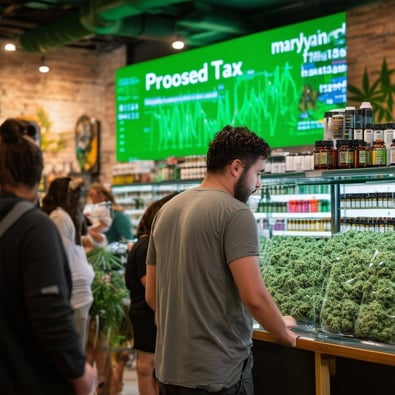The newly reconfigured agency charged with policing Maryland's illicit cannabis market will set up offices in Baltimore before legal recreational cannabis sales kick off on July 1.
The Maryland Board of Public Works last week approved a 24,292-square-foot office lease and a 3,700-square-foot storage lease for the Maryland Alcohol Tobacco and Cannabis Commission at 1215 E. Fort Ave. in Locust Point. The commission will sublease the space from the Maryland Auto Insurance Fund, which no longer needs the large office because of its hybrid work model.
The combination of office and storage space means the ATCC, an expansion of the previous Alcohol and Tobacco regulatory body, will have plenty of space to expand as well as to store contraband now that its responsibilities include the nascent legal cannabis market, executive director Jeff Kelly said. The ATCC will be in charge of the enforcement of laws against illegal cannabis distribution, while the Maryland Cannabis Administration, a successor to the Maryland Medical Cannabis Commission, will be in charge of licensing and crafting regulations.
The combined two leases will cost $774,306 a year. The ATCC was previously located in the Goldstein Treasury Building in Annapolis, where it had already started to outgrow its space. In 2021, the state separated the alcohol and tobacco enforcement agency from the Office of the Comptroller, giving the agency more freedom to relocate. Kelly plans to add 22 staff members this year to deal with the larger responsibility of policing cannabis. The ATCC will only enforce laws around cannabis, while regulation and licensing will be part of the Maryland Cannabis Administration.
The illicit market for cannabis will operate differently than that of cigarettes. The black market cigarette trade is driven mostly by people moving tobacco across state lines to get around taxes. Kelly believes that stores like gas stations selling cannabis products without a license will be the biggest problem facing Maryland, not the importation of products from other states.
“The commodity itself is no longer illegal in the state,” Kelly said. "So [unlicensed businesses] can find a source and take advantage of selling cannabis. It really requires a robust inspection and enforcement program on the illicit side.”
The illegal sale of cannabis will be prosecuted as business crimes like selling without a license or selling without a sales and use tax account that typically lead to citations instead of criminal arrests, Kelly said.
Once it gets going later this summer, the recreational cannabis market is expected to become a massive industry in Maryland, raising over $1 billion a year in sales. When setting up the regulatory framework for the market earlier this year, state legislators set a cannabis sales tax rate of 9% with hopes that the low rate will make it harder for the black market to compete with a large supply of relatively cheap, regulated legal cannabis.




